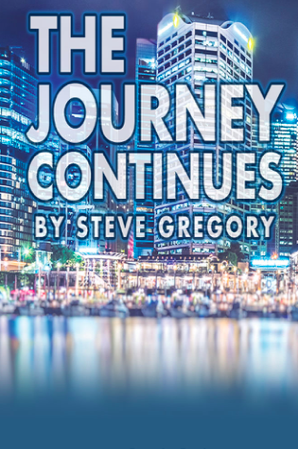
BY: STELLA SLOAN
Long time BIST members likely know Steve Gregory, a former board member at BIST and a TBI survivor, who has now completed a second book on his thoughts about life after brain injury rehab. Steve has also started a non-profit organization called After Acquired Brain Injury Rehabilitation.
I’ve read both of Steve Gregory’s books, The Journey – Tips And Tales and The Journey Continues. His memoirs reveal that Steve developed psychosis in his teens which went undiagnosed and untreated for years. On June 2, 1999, at the age of 36, Steve was in a truck crash that resulted in a Traumatic Brain Injury (TBI). As a result, Steve required an extensive variety of therapies to achieve his best possible outcome. He has managed to be resilient after these major medical transitions in his life. How he was able to accept, prosper and redefine certain areas of his life after acquiring these medical conditions and diagnosis is the basis behind his books.
Shortly after, medical and rehabilitation professionals determined Steve could not go back to work, something which angered him greatly. However, when I asked Steve if he misses his job he replied, “No, I have much more important things to offer.”
After Steve’s truck accident his paranoia was forcibly reduced, by the accident and by the subsequent care of the medical staff. Steve was in a wheelchair and he had no cognition. His medical care and therapy began. His goal was recovery. Steve realizes that his journey of recovery has caused him to learn a lot. Through his personal experiences, Steve highly recommends stimulating your brain on a daily basis. “Utilize any idle time that you have to make your brain better,” says Steve.
For Steve a few of several learning curves during formal and self rehabilitation are as follows:
- Set up some attainable goals no matter how small.
- Focus on what the survivor can do, not can’t do.
- Reflect, using first your long term memory, then your short term and working memory.
- Self congratulations is necessary.
- Utilize your personal motivation.
- Focus on expanding your self awareness.
- Exercise! (Steve enjoys running at the Achilles Club and the comaraderi that he shares with others there.)
- Be of service to others.
- Be your own cheerleader.
- “Optimize your day before it happens.” Analyze, organize and plan, plan, plan!
- Relax and be patient with yourself.
- Have a hobby.
- Write (agenda, lists, tasks, and daily reflections)
- Humour is a must!
These suggestions, Steve believes, all assist in one’s progress with several executive functions: memory, problem solving, reasoning, thinking, decision making, multitasking and connecting ones neutrons. All of this progress then leads to greater self awareness and self esteem.
Steve says after a brain injury each individual is going through a form of rebirth. It is necessary to make the most of this second chance at life, despite the hardships and frustrations.
Figuring your life after an ABI is like solving a puzzle: it is a lengthy process, difficult and often boring. However, you need to make goals, relax and unwind and find the fun in rehabilitation in order to recover and to regain your personhood.
According to Steve’s books, five things that promote healing are: eating well, sleeping, exercise, having an active mind and prayer. Being persistent is the key. Be open to learning, unlearning and relearning. However, when you are getting tired of a problem relax and come back to the problem later.
As a survivor of a brain injury, Steve has learned that we need to switch from a therapy that is ‘done to you’ to that of ‘doing it to and for yourself.’ The best place to start is relearning how to think. Rehabilitation is no small task. Steve estimates that he spent 40 hours per week for twenty years in rehabilitation.
More advice from Steve: use your short term memory sparingly; there is a limit to what your brain can hold. The brain then uses its working memory to transition your short term memory to your long term memory. Life skills are essential for re(learning) how to live independently, the ultimate result! The future of an ABI survivor rely’s on their resources. Without sufficient resources a person can be forgotten by society.
“It is important to be at peace with yourself, the world around you and in the presence of God,” Steve said. When asked his advice for others with an ABI, Steve said, “Be true to yourself and there is lots of positive things that you can do.”
Thank you Steve for seeing the glass as half full.
FEATURED IMAGE: Steve Gregory’s second book on recovery from an Acquired Brain Injury
Steve will be a guest speaker at our November Community Meeting on Wednesday, November 25 from 6 – 8 PM, where the main topic will be about the Brain Injury Speaks Network. Find out more about our meeting, HERE.
Stella Sloan is an ABI Survivor, and a member of the day program at the Brain Injury Association of Durham (BIAD).





